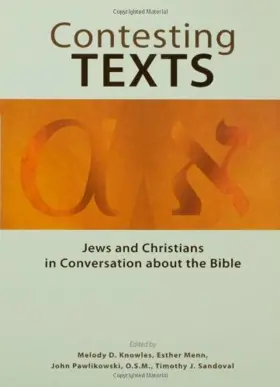

Contesting Texts: Jews And Christians in Conversation About the Bible
Pages
229
Publisher
Fortress Press
Published
2007
ISBN-13
9780800638429
Themes explored include: biblical authority, texts of violence, tradition, identity and the other, common hope.
Contributors include: David Novak, Barbara Rossing, Steven Weitzman, Hindy Naiman, Ralph Klein, Barbara Bowe, Larry Edwards, Sarah Tanzer, Walter Brueggemann, Susan Brooks Thistlethwaite, and David Sandmel.
Inner Books
This physical volume has several internal sections, each of which has been reviewed independently
- Can we hope? Can we be divided? by Walter Brueggemann
Reviews
Minneapolis: Fortress, 2007. Pp. x + 229. Cloth. $29.00. ISBN 0800638425. Ithamar Gruenwald Tel Aviv University Tel Aviv, Israel This volume consisting of eleven papers discusses what turned out to be a landmark document in Jewish-Christian relations, Dabru Emet (Hebrew for “Speak the Truth”). The document was written by four biblical scholars and published in the New York Times in September 2000, that is, one year before 11 September. I mention 11 September for reasons that will become clear later on. The volume reflects the transactions of a conference held by four denominational institutions in the Chicago area (Catholic Theological Union, Chicago Theological Seminary, Lutheran School of Theology at Chicago, McCormick Theological Seminary) on 28 February–1 March 2005. The speakers and, later, contributors to the volume were Jews and Christians who felt bound by an inner commitment to respond to the contents of the Dabru Emet document. In essence, the document contains the message of four authors: Tikva Frymer-Kensky, Peter Ochs, Michael Signer, and David Novak. They felt that a Jewish reaction was appropriate due to “a dramatic and unprecedented shift in Jewish and Christian relationship.” In preparing myself to write this review, I was confronted by the question: What vantage point is adequate to convey a critical assessment of the intellectual climate and message contained in the volume? Although those who contributed to the volume came from scholarly institutions, this is not a scholarly volume in the narrow sense of the word. Clearly, the theological tones are more audible in it than the scholarly ones.
[Full Review]
